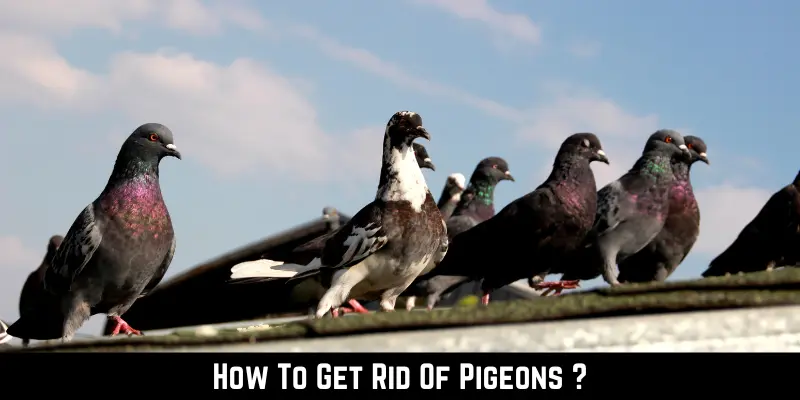Have you tried to get rid of pigeons in the past with no success? You might have heard “rats of the sky” as a term to refer to pigeons. Whoever coined this term had a good reason. If they’re not pooping on the sidewalk, they’re contaminating the food, damaging buildings, blocking gutters, spreading diseases, and blocking drainage.
It then begs the question: How do I get rid of pigeons?
That’s where we come in. To offer you solutions we have tried to get rid of pigeons at home. Most importantly, we talk about the products you can use to eliminate these birds naturally or chemically.
Before diving into that, let’s look at the challenges these birds cause at home first.
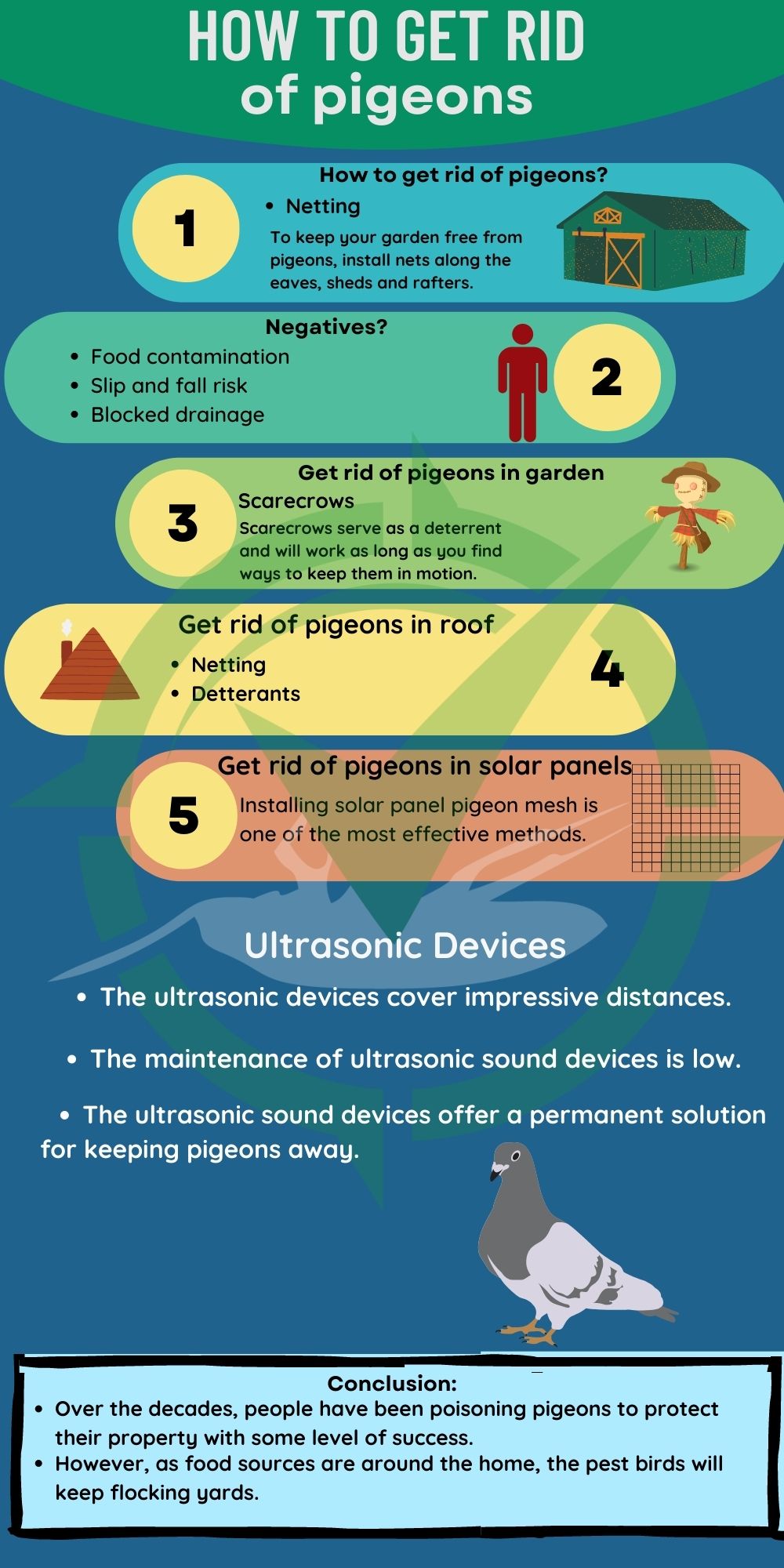
Why Are Pigeons Not Good?
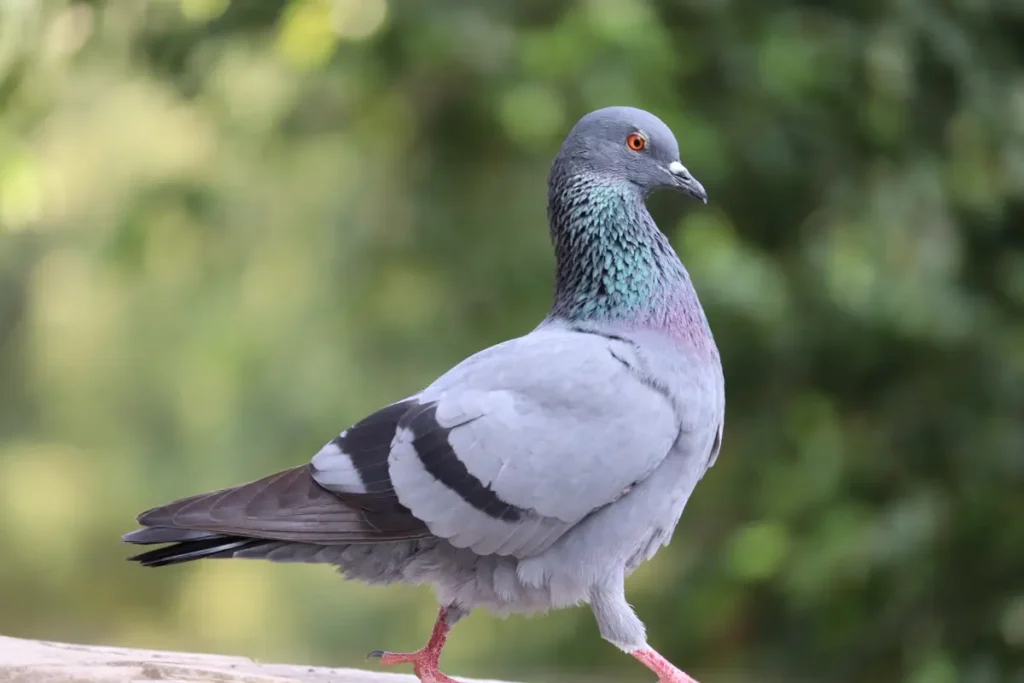
Pigeons can damage a house or business premises when left uncontrollable. The damage caused by pigeons is expensive when you factor in the repair and maintenance costs of buildings.
Here are the problems pigeons are likely to cause at home or on your business premises:
- Spread of diseases: Pigeon poop carries diseases such as histoplasmosis, cryptococcosis, and psittacosis. These diseases are dangerous and life-threatening to persons with asthma or a weak immune system.
- Food contamination: Pigeons are known to contaminate food meant for livestock and human consumption. Pigeons eat all kinds of food.
- Slip and fall risk: Pigeon droppings are slippery and can make walkways, decks, and porches dangerous for foot traffic. The risk of slipping is a severe problem for residential and commercial premises.
- Corrosive damage to buildings: Pigeon droppings are acidic, causing damage to structures, vegetation, siding, and the landscape.
- Blocked drainage and gutters: Pigeon nests in drainage pipes, gutters, or downpipes disrupt the smooth flow of water, which in turn may cause flooding and bursting of pipes. Pigeons can build their nests in chimneys and other key ventilation pathways. The nests on the flues and chimneys allow a build-up of poisonous gases and pose a fire risk.
If pigeons keep flocking to your property, you will likely experience one or more of these problems. You need to act soon to avoid further problems. It might interest you to learn that pigeons can multiply quickly.
With an incubation period of 18 days and each mature female pigeon hatching up to three chicks, you can expect the pigeon numbers to go up quickly.
The more the number of pigeons on your property, the more problems you will face, often leading to costly and sometimes irreversible damage.
The loud calls from pigeons can be a problem for many people. The pigeon calls are loudest during specific seasons of the year when the birds are breeding.
When a pigeon calls, it penetrates roofs and may occur throughout the night, disrupting sleep patterns and lowering your quality of life. Pigeon poop may also have adverse effects on the health of both humans and pets.
How To Get Rid of Pigeons from a Balcony?
Pigeon droppings corrode, discolor and weaken the balcony with time. Pigeons love to occupy the balcony. Fortunately, you can take the following proactive and practical steps to deal with the pigeon problem.
Netting
When you put a net around the balcony, it forms a physical barrier that keeps the birds from inhabiting your balcony. Hung the net from down to the sides to effectively seal off the area and keep the pigeons from coming in.
The netting option of keeping the pigeons off your balcony is advantageous because it is both practical and won’t interfere with the property’s aesthetic value. If you have the time to hang and maintain the nets, you can effectively keep the birds off your house.
Deterrents
You can discourage pigeons from sharing your home or inhabiting your business premise by using repellants, pigeon spikes, and even plastic birds of prey.
Pigeon spikes are particularly effective because they keep the pigeons from perching on the balcony railing. There are other deterrents you can use, such as sound machines.
You can also get wind chimes or other specially designed motion-activated sound devices; the better is to get one with reflected light.
The deterrents are easy to install and budget-friendly. The only downside of using deterrents is that they tend to lose their effectiveness with time and can also make your balcony look somewhat unappealing.
How to Get Rid of Pigeons from a Garden?
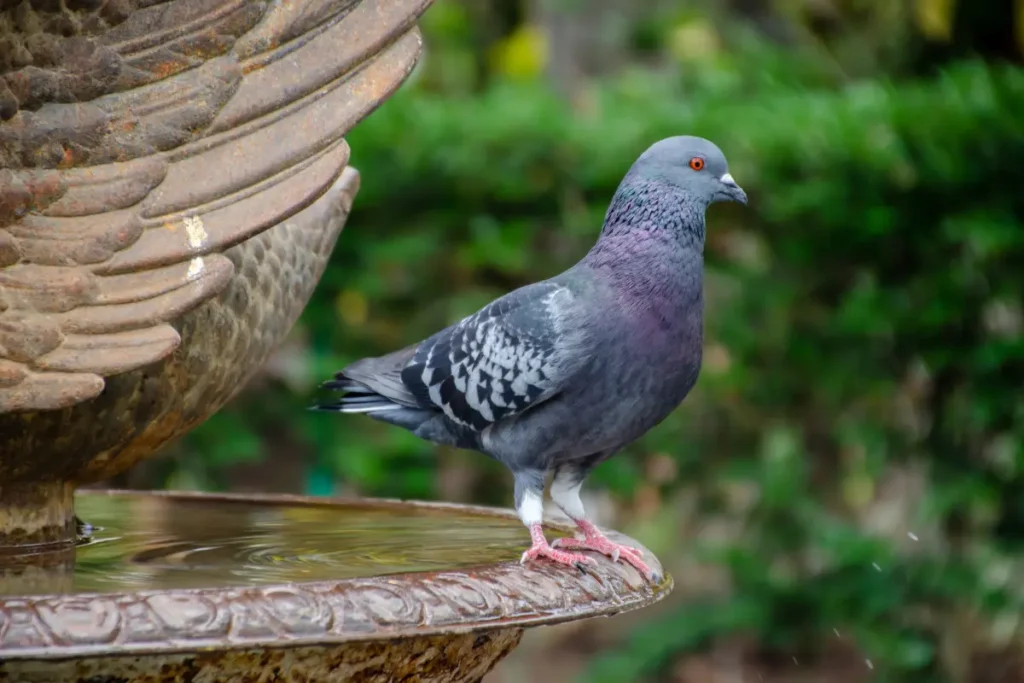
Pigeons love most garden plants and vegetables such as cabbage, cauliflower, broccoli, and sprouts. If any of these birds flock to your garden, they can wipe it out. The acid feces of pigeons causes stunted growth in garden plants as well.
Your first strategy for getting rid of pigeons in your garden is to identify spots where they frequent. Once you have their high target area, deal with the birds in a targeted fashion.
Here are practical measures you can put in place to drive or deter pigeons from frequenting your garden and causing damage.
Scarecrows

Scarecrows serve as a deterrent and will work as long as you find ways to keep them in motion.
You might want to add a scarecrow that resembles predator birds such as a hawk. A scarecrow that encompasses a combination of light and movement and thereby scares pigeons who try to roost in your garden.
Keep changing the position of the scarecrow after a few weeks to keep the birds on their toes. You don’t want to see a pigeon roosting right on top of the scarecrow! Scarecrows are affordable, easy to install, low profile, and in no way lethal.
The use of scarecrows also comes with two cons. One, their effectiveness can decrease over time, and secondly, it may not be effective in excluding the birds or physically protecting your garden and the plants in it.
Netting
To keep your garden free from pigeons, install nets along the eaves, sheds, and rafters. Netting will protect your garden and even keep the birds from sheltering close to your garden.
Some gardeners prefer to cover their raised beds and the crops they are keen to protect. Nets effectively prevent roosting and predation, and you can get them at affordable prices in your local store.
Netting is not without cons when it comes to protecting your kitchen. Many people find it time-consuming to install the netting system, and if you are looking for total protection of your crops, you should have the entire garden under the netting system.
Use pigeon-proof feeders
Bird feeders in your garden may be attracting pigeons and other bird pests. To effectively keep the birds away, you need to invest in pigeon-proof bird feeders.
The pigeon-proof bird feeders come with a cage that only allows small birds through but not larger ones like pigeons. You can also get weight-sensitive bird feeders that give in when larger birds of pigeon size step on them, and you will see a reduction in the number of pigeons thronging your kitchen.
The pigeon-proof feeders effectively keep pigeons away because of the cut down on the bird’s food sources, even though you might not entirely get rid of pigeons using this method alone.
How to Get Rid of Pigeons from My Roof?
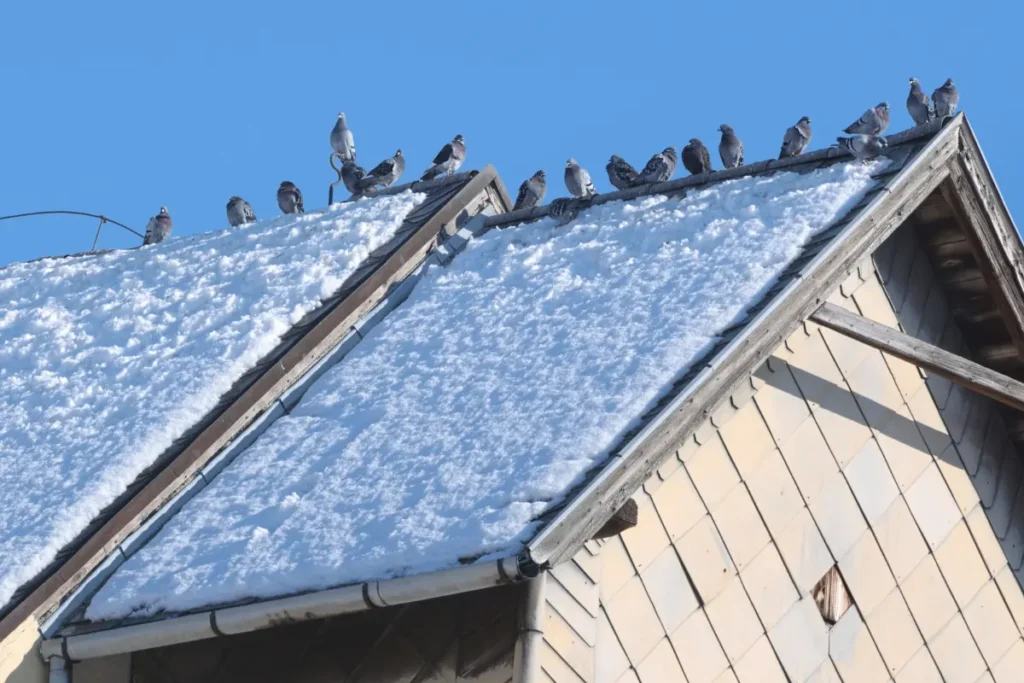
Pigeon poo weakens the roof because of its high acidity. Too many of these pest birds on your roof also means a severe discoloration of your roof.
Getting rid of pigeons from your roof demands creativity and commitment. If there are eaves or pitches on your roof, the task will be more demanding because these spots are conducive nesting places for pigeons.
However, the following methods will be effective in helping you get rid of pigeons from your roof.
Deterrents
Deterrents are the safest means of getting rid of pigeons without killing them.
Get roof pigeon deterrents such as stainless steel wires, wire coils, and spikes. The pigeons will fly down to your roof but will be discouraged from perching.
They will try this a few more times before they give up, and you will have won. To be effective, install the deterrents on all the flat surfaces where pigeons are likely to land.
The surfaces you should have the deterrents on include caps, flashing, and drip edges. The deterrents are simple to install, non-lethal, and won’t be too conspicuous.
The downside is that roof pigeon deterrents might keep the pigeons from perching and roosting on your roof, but they can still find somewhere to live in the building.
Roof netting
Getting a nylon bird netting on your roof will effectively keep pigeons out. The roof net should cover all the eaves and pitches which attract pigeons.
Additionally, hang the net vertically along the side of the building, and you will keep the birds from roosting on the roof. Pigeon control experts recommend this 50 mm 2gauge net because of its effectiveness in keeping the pigeons away.
Many people prefer nylon roof netting because it blends with the house and is not easily noticeable. While the roof netting takes more time to install and maintain, it is worth keeping the pest birds away.
How to Get Rid of Pigeons in a Barn?
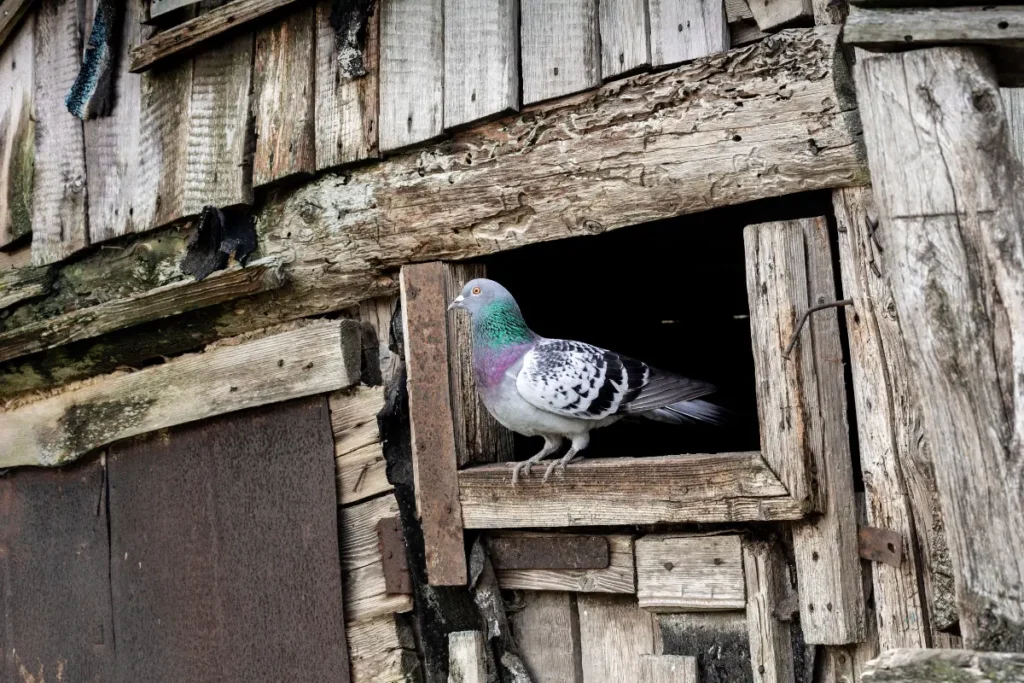
Pigeons carry parasites and diseases. You don’t want these birds sharing the barn with your animals because they will spread these parasites to them in addition to sharing their feeds.
If you need to get rid of pigeons from your barn, use similar tactics in the roof or the attic. Additionally, here are practical recommendations for keeping your bard free of pigeons.
Exclusion
You want to block all the possible areas the pigeons can get to the barn. The most recommended exclusion tool is the wire mesh.
When a strong mesh is installed all around the barn, the chances of pigeons getting into the barn are greatly minimized. The other effective means of excluding the pigeons from getting to your barn is to hang long plastic strips at the entrance.
Hang down the strips to about a foot from the ground. Plastic streams do two things.
It prevents the pigeons from getting into the barn
Allow people, personnel, and equipment to move with ease in and out of the barn freely.
The exclusion method is quite effective and safe for both people and animals. It is also affordable, but the ongoing maintenance can be pretty labor-intensive.
Deterrents
Discourage pigeons from getting into your barn with spikes, gel deterrents, stakes, and sound and light.
They should be placed on potential roosting areas to be more effective in driving them away from your barn. Deterrents are an affordable way of keeping pigeons from coming back, and you can get them for a low-budget.
However, deterrents alone may not keep all the pigeons away; you need to combine this strategy with other methods for better results.
Proper Sanitation
Birds and animals generally make a home where they are close to food. The same applies to pigeons.
The birds will look for places to roost in your barn if they have convenient access to food sources such as grains and corn. To keep the pigeons away, therefore, you should practice proper sanitation in the barn.
Keep your animal feeds in locking lids or plastic tubs and store them in closed-off rooms. If there are any existing sources of food that the pigeons might find appetizing such as spilled grain, get rid of them, and you see a reduction in pigeon numbers.
Clean all the trash and dung disposal sites and, if possible, take them farther away from the barn. Practicing good sanitation will work well if you combine it with other methods.
Besides keeping pigeons away, proper sanitation will also help to keep other pets and rodents from the barn. It might be labor-intensive, but it is worth the effort.
How to Get Rid of Pigeons under Solar Panels?
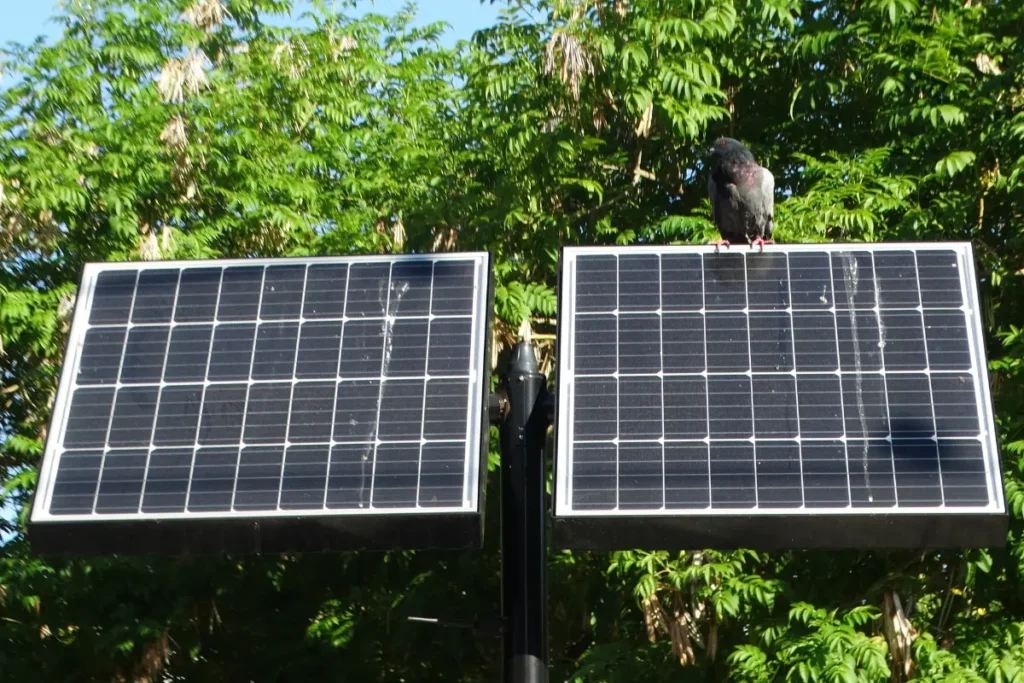
Most of the time, pigeons are attracted to the warmth and shelter offered by solar panels. As such, it can be pretty challenging to get rid of them. All hope is not lost, though. There are a number of steps you can take to ensure they leave your solar panels alone.
Installing solar panel pigeon mesh is one of the most effective methods. The mesh is designed to seal the area around your panels, so the pigeons do not have access to it.
You can also choose to install bird spikes for solar panels. Bird spikes are effective at stopping pigeons because they make it uncomfortable for them to sit in the desired area. Electric shockers are also quite efficient at keeping pigeons away. However, electric strips require more attention than netting and are often rather expensive.
Cleaning your solar panels regularly is a proactive step you can take as well. Keeping your panels in good condition will make them less attractive to pigeons.
Why Are Pigeons Attracted to Solar Panels?
Solar panels are great for the environment and pretty beneficial in terms of saving costs as well. However, when investing in them, one rarely accounts for birds that will nest underneath them. So what is it about solar panels that make them irresistible to birds?
Pigeons and other birds usually use solar panels as a source of shelter. They see them as protection from predators and harsh weather conditions. Solar panels are great nesting spots because the panels create low-shady areas. The pigeons see the solar panels as a safer, more comfortable shelter compared to trees and other nesting areas.
The problem is that with the pigeons nesting under your solar panels, there will be a build-up of nesting materials and poop that will no doubt reduce the effectiveness of your investment. If you are experiencing this problem, you need to take the necessary steps to ensure these pigeons find somewhere else to make their nests.
Can Pigeons Destroy Solar Panels?
One might think, well, they are just birds looking for shelter; where’s the harm in that? Pigeons create quite a problem for solar panels for a number of reasons. First of all, pigeons poop a lot, and this feces shade the panels.
The design of the panels is in such a way that their surface should be in full sunlight in order for them to work effectively and generate energy efficiently. Therefore, if there is any shading on the panels, this will prevent them from working effectively. When the panels are shaded, electricity production is drastically lowered.
If the group of pigeons is particularly large, the droppings will dirty the panels so severely that they will not work at all. At this point, the panels are worthless unless they are cleaned. Aside from the shading, the pigeons can cause short circuits and even put the house at risk of fire.
Pigeons are generally attracted to bright colors; hence they may try to remove the exposed wiring or chew through them. This can be pretty costly for you, so it is better to find ways of getting rid of the birds before they cause irreparable damage. The pigeons could also be an attraction for other pests. When they nest under the solar panels, the chances are high that other small pests like mice, possums, and squirrels will also be attracted.
Methods You Can Use to Remove Pigeons from a Warehouse?
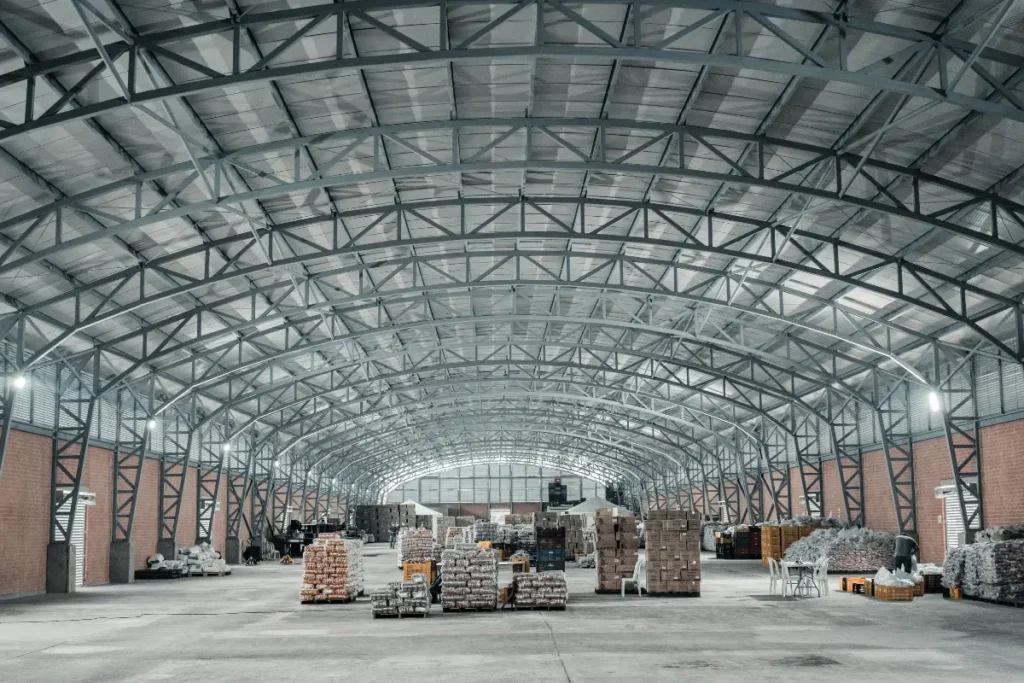
Warehouses generally attract pest birds. This is because their high rafters provide abundant nesting nooks, warm shelter, and protection from predators. Pigeons, for instance, can create costly problems for warehouse managers. Luckily, there are a few methods that can be used to get rid of pigeons.
Sonic Bird Deterrents Scare Pigeons
One of the reasons the pigeons are attracted to your warehouse is because they provide protection from predators. If they believe that these predators occupy your warehouse, they are more likely to move on to safer places.
Sonic bird deterrents are designed to broadcast pre-recorded distress and predator calls that the pigeons recognize as dangerous. They also come with a built-in speaker to cover the whole warehouse.
You can mount them just outside your warehouse entrance or inside under a skylight. They are usually made using weather-resistant materials, so you can use them year-round.
Heavy-Duty Bird Netting
Installing bird netting is another effective method of keeping pigeons away from your warehouse. The bird netting should be strong, lightweight, dark in color, and have appropriately-sized squares to eliminate pigeons and even smaller birds.
This is one of the best methods to use because it is a generally affordable and long-term solution that will not interfere with the ventilation in your warehouse.
Coating Roosting Areas with Repellent Gels
If the pigeons are roosting on your beams and rafters, you can use repellent gels to prevent this from happening. You can opt to coat their favorite roosting areas with repellent gel, which is usually a slippery substance that is made to keep the pigeons off.
The pigeons are more likely to avoid those surfaces because they do not like the feel of the substance on their feet. You should remember, though, to reapply the gel after six months at the most because the substance will be coated with dust or dirt, rendering it ineffective. This is not the most effective method as most of the time, the gels are quite messy, and they might leave stains or cause damage to your beams.
Using Vinyl Strip Doors
Vinyl strip doors provide a bird barrier. These are ideal for keeping the pigeons out of specific warehouse areas. They come in various standard sizes and feature full overlapping flat strips. The vinyl panels also come with all the hardware needed to hang them.
The panels separate easily to allow the crew, loaders, and forklifts to pass through while barring the birds from accessing these areas in your warehouse. This is another inexpensive option that does not require a lot of maintenance.
How to Get Rid of Pigeons Without Hurting Them?
You don’t have to hurt or kill pigeons to keep them off your home or commercial building. There are multiple ways you can safely get rid of pigeons, pigeon nests, or even pigeon poop.
While pigeons can be a bother and even cause structural damage, here, you will find several ways to discourage them from roosting and nesting in your property.
You can make potential nesting areas less appealing for pigeons and other birds.
Using deterrents such as bird netting, bird gels, spike strips, and loud ultrasonic devices can appeal to the natural responses of pigeons and offer a humane approach to bird pest control. Here are effective ways to rid of pigeons without hurting them.
Use Of Pigeon Bird Netting
Using pigeon bird netting works whether you face a considerable pigeon problem or occasional pigeon roosting and nesting on your property. The netting option is practical, especially in balconies, high-level roofs, and places where access is a challenge.
Advantages Of Using Bird Netting
- Little Impact On Property Aesthetics: Fixing the bird netting around the target areas of the property will not impact the appearance of the building that much. You won’t even notice there is a net from a distance. If you place the bird netting on a rooftop, you may not even notice it.
- Quick results: You don’t have to wait for days to see if the netting solution works. The results from the netting solution are instant because pigeons and similar birds are immediately blocked from getting through the netting. That means as soon as the net is installed, pigeons lose access.
- Versatility: You can install the pigeon netting in every direction and have it cover all the target areas, including unique roof shapes and statues. You can install the net yourself or get the services of professionals if the area to be covered is extensive or complex. Additionally, the bird netting will not target pigeons alone but effectively stops larger birds and seagulls alike. The bird netting can withstand harsh environmental conditions such as rain, and hot and cold temperatures.
Spike Strips
While pigeon pike spikes appear to hurt, they are safe and effective in keeping pigeons away. The human bird spikes are designed to live in too little space that is not enough for the pigeons to roost and nest. You only need to make sure they are correctly placed.
Advantages of pigeon spikes
- You can use the spikes in multiple areas of your property. Pigeons are good at identifying empty spaces, and you need to place the pigeon spikes in many areas to reduce the chances of pigeons finding a conducive nesting place. The strips are ideal for use in balcony rails, exposed sills, and beams.
- Pigeon spikes last for longer because they are made from rugged and durable materials. The bird spikes can be made from sturdy stainless steel or polycarbonate materials, hence can last for years.
- Budget-friendly– the bird spikes are a cost-effective way of keeping pigeons away without harming them. Utilize your space effectively as well by using the right amount of spikes.
Deterrent Bird Gels
Bird gels manipulate pigeons by creating an ultraviolet surface for the pigeons. The UV light triggers the pigeon’s flight response. The pigeons are made to believe the space is a threat and therefore not conducive to nests.
Bird gels manipulate pigeons by creating an ultraviolet surface for the pigeons. The UV light triggers the pigeon’s flight response. The pigeons are made to believe the space is a threat and therefore not conducive to nests.
Benefits Of Using Bird Gels To Get Rid Of Pigeons
- The bird gels are harmless and environmentally safe. Natural oils make up the deterrent gel hence non-toxic to pigeons and any other animal.
- No impact on your house’s aesthetics-While pigeons will see the ultraviolet light and feel threatened, people, on the other hand, will not see a thing at all. If you are looking for a discreet and effective method of keeping pigeons and other birds from your property, the gels are your go-to measure. The bird gels work pretty well on outdoor sculptures and old buildings.
- Gels deter pigeons for longer. You can expect the bird gels to keep the pigeons away for over a year before you can consider a replacement. If you want the bird gel to last longer, ensure they are correctly installed.
Ultrasonic Devices
Pigeons and birds generally respond differently to sound than people. Specific frequencies work well in scaring birds without bothering humans, and that is the basic working of an ultrasonic device.
You can get ultrasonic sound devices that scare pigeons by producing bothersome sounds that people may not even hear.
Benefits Of Using Ultrasonic Sound Devices
- The deterrent ultrasonic sound devices are small and discreet. Unlike the spikes or gels, you do not need to have sound devices all over the house. The ultrasonic devices cover impressive distances. However, the device’s effectiveness decreases with distance which means if you have larger spaces, you need to get one or more of the sound devices.
- The maintenance of ultrasonic sound devices is low. While they use electronic waves and depend on electricity to function, they use a tiny amount of power. The batteries in the sound devices last for a long time, and you will not need to replace them very often. You can also get solar-powered sound devices to help you keep the birds away.
- The ultrasonic sound devices offer a permanent solution for keeping pigeons away. The birds will keep their distance and stay away from where the ultrasonic sounds are being produced. As long as the sound device is functioning, you won’t have a problem with pigeons in space.
Can You Legally Kill Pigeons?
Pigeons are pests and cause the same problems as rodents. No doubt about that but can you legally poison them? In the United States, pigeons are not protected under state or federal law.
The American Bird Treaty Act 1918 is in place to protect native wild birds making it illegal to remove their nests or kill them. However, pigeons are non-native pests.
However, before you consider the use of poison as a measure to kill pigeons, check with your local animal welfare department and find out if the use of avicides is legal.
Additionally, individual states have individual regulations on how to deal with pigeons. Other states freely allow poisoning, while others take it as a form of animal cruelty.
Pigeon poison is cheap to buy and simple to apply. However, the chemical ingredients can be a threat to other animals, both domestic and wild.
Every State in the United States of America has different rules and regulations to deal with pigeons. Some states allow and some states don´t allow the killing of pigeons by any means.
To check every State’s rules and regulations about killing Pigeons, do read the full articles.
Laws To Kill Piegeons In USA States
| State | Laws |
|---|---|
| New York | Legal to kill pigeons in NYC, if you’ve a hunting license, except homing, leg bands, and Antwerp pigeons. |
| California | Legal to kill pigeons in California, if have License but need an additional permission letter for hunting Band-tailed pigeons. |
| Florida | Legal to kill pigeons in Florida, except migratory birds, including the White-crowned, Homing, and Band-tailed pigeons. |
| Nevada | Legal to kill pigeons in Nevada except common ground dove. |
| Virginia | Legal to kill pigeons or any other birds in Virginia except homing peigeons. |
| Utah | Legal to kill pigeons in Utah except Eurasian collared doves. |
| Texas | Legal to kill pigeons in Texas, as long as you possess a hunting license. |
| Arizona | Legal to kill pigeons in Arizona on your property. |
| Las Vegas | Legal to kill pigeons in Las Vegas, if you’ve license. |
| Hawaii | Legal to kill pigeons in Hawaii with valid license. |
| Alaska | Legal to kill pigeons in Alaska except Band-tailed Pigeons. |
| Georgia | Legal to kill pigeons in Georgia except Mourning doves. |
| Washington | Legal to kill pigeons in Washington on your property. |
| Massachusetts | Illegal to kill pigeons in Massachusetts except land owners. |
| Ohio | Legal to kill pigeons in Ohio Except homing pigeons. |
| Pennsylvania | Legal to kill pigeons in Pennsylvania Except homing pigeons. |
| Colorado | Legal to kill pigeons in Colorado. |
| New Jersey | Legal to kill pigeons in New Jersey, except migratory pigeons. |
| Oregon | Legal to kill pigeons in Oregon except migratory and endangered pigeon species. |
| Michigan | Legal to kill pigeons in Michigan. |
| North Carolina | Legal to kill pigeons in North Carolina except except migratory pigeons. |
| Illinois | Legal to kill pigeons in Illinois except migratory pigeons. |
| Montana | Legal to kill pigeons in Montana. |
| Indiana | Legal to kill pigeons in Indiana except migratory pigeons. |
| Louisiana | Legal to kill pigeons in Louisiana except Homing doves and Band-tailed pigeons. |
| Maryland | Illegal to kill pigeons in Maryland except for unprotected pigeons and game birds |
| Missouri | Legal to kill pigeons in Missouri except few protected pigeon species. |
How to Kill Pigeons With Poison?
Pigeon poisons are generally grain or pellets and are scattered in target areas where pigeons flock to feed. You can mix the avicides with regular food to feed freely, but this might not be necessary because pigeons are natural scavengers and readily consume what you give them.
The avicides make the pigeon poison extremely toxic and target the nervous system of the bird. Once the bird eats the poison, they soon become disoriented and show little control when flying. The pigeons develop violent convulsions before they die.
Pros Of Using Poison To Get Rid Of Pigeons
- The pigeon poison is cheap.
- Have a higher success rate at getting rid of pigeons
The cons surrounding the use of pigeon poisoning outweigh the pros. That is why it is recommended that you use alternative ways of getting rid of pigeons.
Cons of using poison to kill pigeons
While avicides are effective, there are serious side effects that you cannot ignore.
- The dead birds die in hidden places, and the carcass will remain hidden until it begins to produce a pungent stench. You will find it challenging to find and reach out to the dead birds. Dealing with several smelling bodies of a flock of pigeons is not something many people want.
- Pigeons have parasites and diseases, which means it is a health risk when disposing of the carcasses.
- The other disadvantage of using avicides is that you cannot know that pigeons alone are taking the bait. You might end up killing other animals in the process. Even if you succeed in targeting pigeons, other animals can eat the carcasses leading to secondary poisoning.
Main Ingredients Making Up Pigeon Poison
When buying pigeon poison, check out the active ingredients in the product. Here are the common ingredients in avicides.
Alphachloralose – This pigeon avicide often comes in the form of treated grain form. Pigeons feed on the average grains and, in the process, get used to the texture and taste before replacing them with the avicide. Alphachloralose, once ingested by the pigeon, makes the bird in a stupor state, which finally results in death.
Avitrol –This avicide has 4-aminopyridine as the active ingredient, meant to attack the bird’s central nervous system. The pigeon soon develops convulsions and, in turn, affects its flying ability. After a while, the birds will fall and flap fatally.
Thallium- The avicide containing Thallium is mainly administered to pigeons through inhalation and oral consumption. The poison is tasteless, and you can mix it with their food. Thallium makes pigeons nauseated and vomits before they die.
Homemade Remedies to Get Rid of Pigeons

There are multiple home remedy options you can try to get rid of pigeons. However, they might not work on their own.
You might want to try home remedy techniques with alternative pigeon control methods such as bird nets, spikes, and scarecrows.
Here are practical home remedies you can try to get rid of pigeons.
- Honey- Birds, including pigeons, hate perching on sticky surfaces, which is why you want to spread honey on surfaces where pigeons frequently perch. The only downside with honey is that it may attract rats, ants, and other pests.
- Use of spices such as black pepper and cinnamon: Place black pepper, chili, and pepper bags in generous amounts around your home. The smell of this stuff is natural repellent and will likely discourage pigeons from visiting. You can also sprinkle pepper powder generously in areas where pigeons frequent. Do this twice daily for about a month till the pigeons find another place to nest.
- Remove the birdbath- When pigeons cannot find water to drink, they will naturally look for nesting places where they can easily access water. Getting rid of birdbaths will help keep pigeons, mosquitoes, and other rodents at bay; if you cannot get rid of the birdbath, clean and frequently replace it with fresh water.
- Pets- Keep dogs and cats. Pigeons dislike dogs, and cats will try to hunt the pigeons chasing them away from your property.
- Boiled rice-Naturally, pigeons enjoy feeding on dry crumbs and uncooked grains. The smell of cooked rice repels pigeons. Boil about a cup of cooked rice and sprinkle around the nesting places of the pigeons. You can use sidewalk chalk to draw circles around the rice to prevent ants from taking the cooked rice away.
Conclusion
Over the decades, people have been poisoning pigeons to protect their property with some level of success.
However, as food sources are around the home, the pest birds will keep flocking yards.
Therefore, safe and environmentally friendly measures that protect other animals and others are the best bet for getting rid of pigeons.
